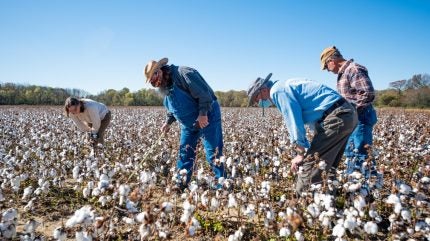
The report, initially presented at the 2025 Better Cotton Conference in June, reveals that Better Cotton has a network of 316 licensed growers in the US, a 1500% increase.
They produce 1,499,655 bales of cotton, which accounts for more than 11.5% of the nation’s total cotton volumes.

Discover B2B Marketing That Performs
Combine business intelligence and editorial excellence to reach engaged professionals across 36 leading media platforms.
Better Cotton US Programme senior country manager Ashley Barrington said: “Better Cotton’s US Impact Report speaks to the people on the frontline of our industry whose commitment and dedication has been intrinsic to continuous improvements at the farm-level. Collaboration is at the heart of our mission, and this report is testament to that. The insights it generates will help us take stock of progress and plan for the future.”
Highlights from Better Cotton’s 10-year US Impact Report:
The reports said that environmental improvements have been observed along the US Cotton Belt, a region in the southern US which stretches from Virginia to California.
These include advancements in soil health and biodiversity, reductions in pesticide applications, and improved water use efficiency in areas where Better Cotton operates.

US Tariffs are shifting - will you react or anticipate?
Don’t let policy changes catch you off guard. Stay proactive with real-time data and expert analysis.
By GlobalDataA notable shift towards more sustainable practices is evident in the increased use of organic fertilisers by Better Cotton licensed growers.
From 2014/15 to 2023/24, there was a rise from 6% to 17% in their application.
Furthermore, there has been a substantial decrease in the use of highly hazardous pesticides (HHPs), with a 26% reduction in pounds of HHP active ingredient applied per acre since the 2020/21 cotton season.
The adoption of regenerative agricultural practices has also been a focal point for Better Cotton growers.
The report shows that as of 2020, more than 80% of reporting US licensed growers have implemented measures aimed at enhancing biodiversity, soil health, and water quality.
In addition to highlighting achievements by individual growers, the report also acknowledges key contributions from allied organisations and institutes that have been instrumental in promoting sustainability within the US cotton sector.
Among these are the Soil Health Institute, Textile Exchange, the US Cotton Trust Protocol, and Cotton Incorporated.





